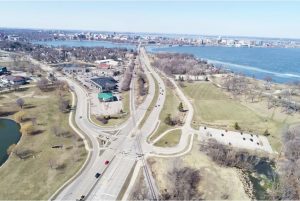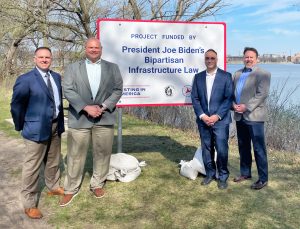John Nolen Drive extends over beautiful Lake Monona and serves as the gateway to the City of Madison. The corridor accommodates over 45,000 vehicles per day — a bustling thoroughfare in the capital city of Wisconsin.
Six bridges are situated along the John Nolen Drive causeway, affected by harsh winter freezes and spring thaws which have taken their toll since originally opening in 1967. All of the two-lane bridges have undergone consistent repair since 2000 due to differential settlement on Lake Monona’s bottom, have effectively reached the end of their service lives, and are in need of replacement. Along with the deteriorating bridges, the causeway suffers from other structural integrity concerns, dangerous roadways and intersections, unsafe biking environments, poor pedestrian access and increasing traffic volumes.

The City contracted with MSA as a subcontractor to KL Engineering for the design of replacement structures and associated infrastructure, which is scheduled to begin in 2025. MSA is contributing shoreline analysis and design services, wetland delineation, hazardous materials investigations, bridge structural design services, utility and roadway coordination, as well as an underpass stormwater feasibility study. The results could vastly improve traffic flow and sustainable use throughout the corridor and boost bicyclist and pedestrian safety with alternative options that included a widened, separated multiuse facility along the Capital City State Trail, which sees up to 4,500 cyclists per day.
MSA is also partnering with Anchor QEA to provide a shoreline analysis along Lake Monona adjacent to the project corridor. This work involves an evaluation of local wind patterns and fetch lengths to determine likely wave heights at the shoreline and the design of shoreline protection systems. The shoreline enhancements will take into consideration the Lake Monona Waterfront Design Challenge and future master planning efforts, while in the interim, could include enhancements such as pervious surfaces, vegetated buffers and rain gardens to capture rainwater where it falls, helping to minimize flooding and improve water quality.
The City of Madison was chosen to receive a $15.1-million Bridge Investment Program grant through the Bipartisan Infrastructure Law for the project in April 2023, one of just nine projects selected for award across the United States.

Representatives from MSA and KL Engineering celebrate the project’s receipt of a Federal Highway Administration Bridge Investment Program Grant.
